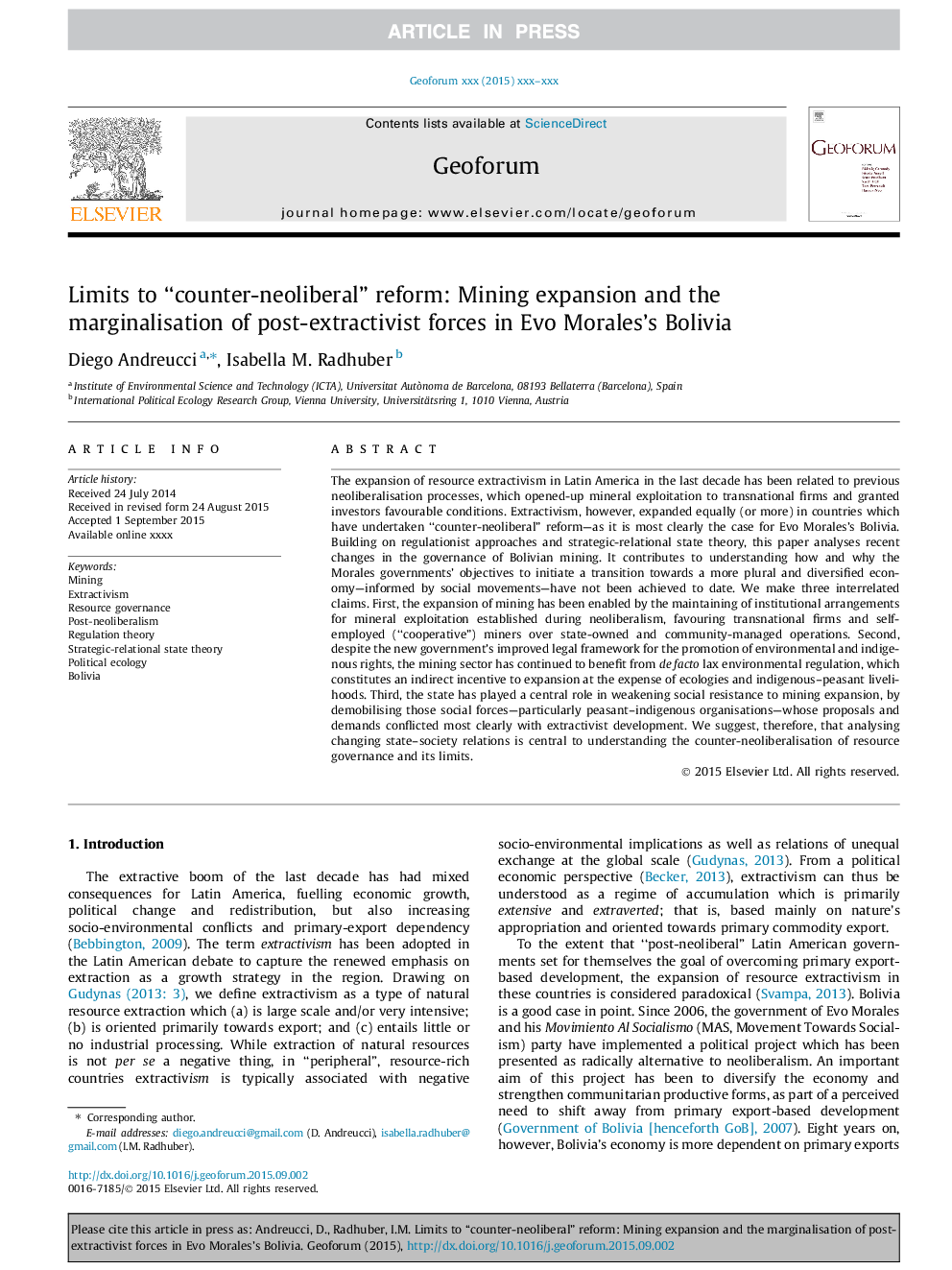| کد مقاله | کد نشریه | سال انتشار | مقاله انگلیسی | نسخه تمام متن |
|---|---|---|---|---|
| 5073301 | 1477105 | 2017 | 12 صفحه PDF | دانلود رایگان |
عنوان انگلیسی مقاله ISI
Limits to “counter-neoliberal” reform: Mining expansion and the marginalisation of post-extractivist forces in Evo Morales's Bolivia
ترجمه فارسی عنوان
محدود به ضد نئولیبرال ؟؟ اصلاحات: گسترش معادن و حاشیه سازی نیروهای پس از بهره برداری در بولیوی اوو مورالس
دانلود مقاله + سفارش ترجمه
دانلود مقاله ISI انگلیسی
رایگان برای ایرانیان
کلمات کلیدی
معدن، غربالگری، مدیریت منابع، پس از نئولیبرالیسم، نظریه مقررات، تئوری دولت استراتژیک و رابطه ای، محیط زیست سیاسی، بولیوی،
ترجمه چکیده
گسترش بهره برداری منابع در آمریکای لاتین در دهه اخیر مربوط به فرآیندهای پیشگیرانه نئولیبرالیزه کردن است که بهرهبرداری معدنی را به شرکتهای فراملی منعقد کرده و شرایط مناسب را برای شرکتها فراهم میکند. با این حال، غارتگری گرایی به طور مساوی (یا بیشتر) در کشورهایی که ضد نئولیبرال را آغاز کرده اند گسترش یافته است؟ اصلاحات - همانطور که بیشتر به وضوح برای بولیوی اوو مورالس است. این مقاله بر اساس رویکردهای تنظیم مقرراتی و تئوری دولت استراتژیک رابطه ای، این مقاله تحولات اخیر در مدیریت معدن بولیوی را تحلیل می کند. این امر به درک اینکه چگونه اهداف دولت های مورالس برای ایجاد تغییر در جهت اقتصاد متنوع تر و متنوع تر توسط جنبش های اجتماعی آشکار می شود، تا به امروز شناخته نشده است. ما سه ادعای متقابل داریم اولا، گسترش معادن با حفظ سازگاری سازمانی برای بهره برداری معدنی ایجاد شده در دوران نئولیبرالیسم، و از طرف شرکت های فراملیتی و کارفرمایان (متخصصان تعاونی) در زمینه عملیات های دولتی و اجتماعی اداره می شود. دوم، علیرغم چارچوب قانونی بهبود یافته دولت جدید برای ارتقای حقوق زیست محیطی و بومی، بخش معدن همچنان از مقررات زیست محیطی ضعیف برخوردار است که انگیزه های غیرمستقیم برای گسترش به هزینه های محیط زیست و معیشت بومیان دهقانی است. سوم، دولت نقش مهمی در تضعیف مقاومت اجتماعی به گسترش معادن با تخریب نیروهای اجتماعی، بویژه سازمان های بومی دهقانی دارد که پیشنهادات و خواسته های آنها بیشتر به وضوح با توسل به توسعۀ غیرقانونی رو به رو است. بنابراین پیشنهاد می کنیم که تجزیه و تحلیل تغییرات روابط بین دولتی و مرکزی در درک نئولیبرالی سازی ضد حکومت منابع و محدودیت های آن باشد.
موضوعات مرتبط
علوم انسانی و اجتماعی
اقتصاد، اقتصادسنجی و امور مالی
اقتصاد و اقتصادسنجی
چکیده انگلیسی
The expansion of resource extractivism in Latin America in the last decade has been related to previous neoliberalisation processes, which opened-up mineral exploitation to transnational firms and granted investors favourable conditions. Extractivism, however, expanded equally (or more) in countries which have undertaken “counter-neoliberal” reform-as it is most clearly the case for Evo Morales's Bolivia. Building on regulationist approaches and strategic-relational state theory, this paper analyses recent changes in the governance of Bolivian mining. It contributes to understanding how and why the Morales governments' objectives to initiate a transition towards a more plural and diversified economy-informed by social movements-have not been achieved to date. We make three interrelated claims. First, the expansion of mining has been enabled by the maintaining of institutional arrangements for mineral exploitation established during neoliberalism, favouring transnational firms and self-employed (“cooperative”) miners over state-owned and community-managed operations. Second, despite the new government's improved legal framework for the promotion of environmental and indigenous rights, the mining sector has continued to benefit from de facto lax environmental regulation, which constitutes an indirect incentive to expansion at the expense of ecologies and indigenous-peasant livelihoods. Third, the state has played a central role in weakening social resistance to mining expansion, by demobilising those social forces-particularly peasant-indigenous organisations-whose proposals and demands conflicted most clearly with extractivist development. We suggest, therefore, that analysing changing state-society relations is central to understanding the counter-neoliberalisation of resource governance and its limits.
ناشر
Database: Elsevier - ScienceDirect (ساینس دایرکت)
Journal: Geoforum - Volume 84, August 2017, Pages 280-291
Journal: Geoforum - Volume 84, August 2017, Pages 280-291
نویسندگان
Diego Andreucci, Isabella M. Radhuber,
